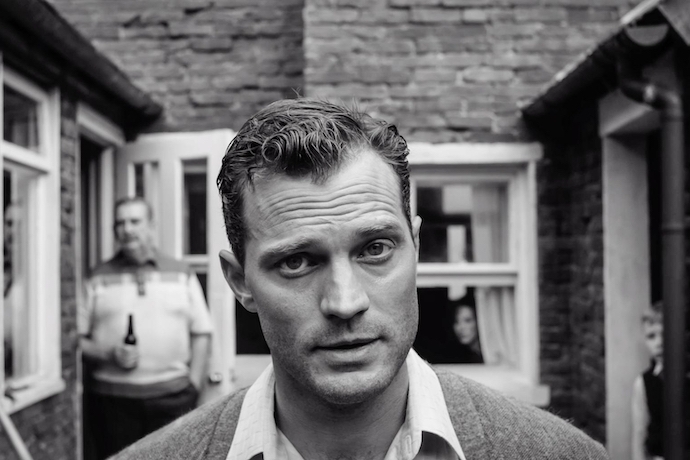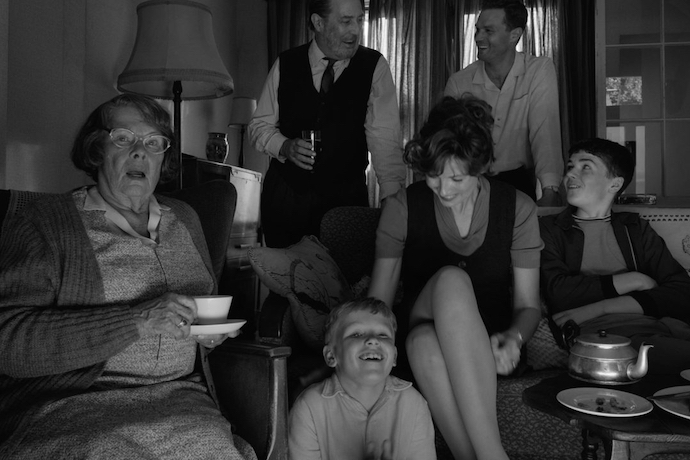Review of Kenneth Branagh’s Very Personal ‘Belfast’
Despite my Irish ancestry, Ireland was vaguely described as a place to avoid during my childhood due to The Troubles. In contrast, the childhood of writer-director Kenneth Branagh was smack dab in the middle of this political and religious mess. Belfast is a sentimental look back at his youth and the connection to his career as a filmmaker. This is very attractive and appealing filmmaking and acknowledges the violent atmosphere without dwelling on it.

An opening aerial view of present-day Belfast shipyards in full color abruptly transitions back to black and white 1969. A young boy plays and skips cheerfully as he makes his way through the idyllic neighborhood. The pleasantries are shattered and give way to the frenzied fear and havoc created by an approaching angry mob. The native Protestants’ goal is to push out all Catholics from the area. The happy young boy we first see is Buddy (played by newcomer Jude Hill), the stand-in for Branagh as a child. While watching, we must keep in mind that we are seeing things unfold through Buddy’s eyes – which are actually the eyes of a middle-aged director looking back on his upbringing. This explains the sentimentality and nostalgia, two aspects handled exceedingly well.
Buddy and his older brother Will (Lewis McAskie) live with their parents Ma (Caitriona Balfe, Ford v Ferrari, “Outlander”) and Pa (Jamie Dornan, “The Fall”), and are close with Granny (Oscar-winner Judi Dench) and Pop (Ciarán Hinds, one of the finest supporting actors working today). Pa spends much of his time away in London working as a carpenter, leaving Ma parenting diligently to create normalcy for the boys during tumultuous times. An added stress is the financial woes Ma and Pa face over tax debt. Granny and Pop are an endearing elderly couple still very much in love, despite their constant needling and bickering.

As things escalate, the division over religion becomes more prevalent. Although he attempts to stay out of the fracas, Pa is faced with the “either with us or against us” decision – something he avoids as long as possible. Ma is obsessed with keeping her boys on the straight and narrow, despite their naivety and the many forces pulling them away. The family finds its emotional escape at the local cinema, which treats us to clips of bikini-clad Raquel Welch in One Million Years B.C.; Grace Kelly and Gary Cooper facing off with a similar ‘stay or go’ dilemma in High Noon; John Wayne, Jimmy Stewart and Lee Marvin in The Man Who Shot Liberty Valance; and Dick Van Dyke in his flying car from Chitty Chitty Bang Bang. The sense of awe and wonder is laid on a bit thick for effect, but it helps us connect young Buddy with present-day Branagh.
It’s quite a family dilemma. How do you decide to pack up and leave the only town you’ve ever called home, and when do you make that decision? When does the danger and turmoil pose too much risk for your kids? A fun scene provides young Buddy a lesson on how to answer, “Are you Protestant or Catholic?” It plays comically but has a serious undertone. Speaking of Buddy, newcomer Jude Hall in his feature film debut, uses his sparkling eyes and an engaging smile to light up the screen. His adolescent pining for Catherine (Olive Tennant), the smart girl in his class, is worthy of the price of admission. All of the actors are terrific, and in addition to young Mr. Hall, it’s Caitriona Balfe (as Ma) whose performance really stands out. Award considerations should be in her future.
Filmmaker Branagh has assembled a crew of frequent collaborators, including cinematographer Haris Zambarloukos, who works wonders with the monochromatic scheme. The soundtrack is chock full of Van Morrison songs – it is Ireland, after all, and the overall feeling is that this is a film Branagh needed to make in order to deal with his childhood prior to his family relocating to England. By not avoiding The Troubles, yet not focusing on it, Branagh has told his story in a personal way that should be relatable to many. It’s a terrific film.

